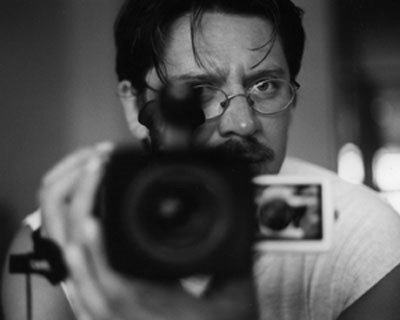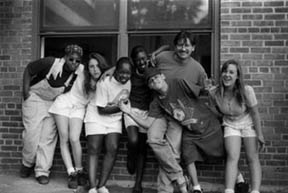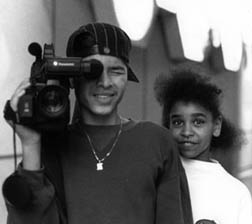 |
As described by Merriam-Webster,
as a noun a mirror is:
1 : a polished or smooth surface (as of glass) that forms images by reflection
2 a : something that gives a true representation
and as a verb:
1. to reflect in or as if in a mirror
The noun mirror is something in which you can see yourself, your image, the visual perception that is you. The verb mirror means to emulate, to make a reflection, a copy, so real, that, just like the mirror on the wall, it appears to be you, it copies you perfectly. It may not be you, in the sense of flesh and blood, but you, in the sense of who you are in the world-what you appear to be on the outside, and who you are on the inside.
Hence, The Mirror Project. A project which, using film as the mirror, strives to portray the world as it is for the filmmaker. But unlike high-budget Hollywood, these films are mainly created by young people, particularly teenagers, in attempts to record the world around them, the world as they know it, as they see it, as they live it. These social documentaries connect youth in communities which, for the most part, do not have the financial means nor the educational options, of expressing themselves technologically otherwise.
By educating youth, many of whom are underprivileged, in the process of filmmaking, Roberto Arévalo is opening doors for these children and allowing them to dream outside of the boundaries within which their own neighborhoods have constrained them.
 |
Currently housed in the Georgia State University Visual Arts and Entertainment Lab, while the project's creator, Roberto Arévalo, completes his Master of Fine Arts, the Mirror Project is ever-expanding. Not having taken on a purposely academic role in the past, except through the academia which is film making, Roberto feels that this current expansion into a university is good news for the project. He feels that The Mirror Project can contribute to academic areas with its ever-growing body of work. He also feels that by working in academic circles, his archive of work is made more well-rounded by ensuring that his filmmakers deal with all facets of society. He says that once academia, and the work he has done in the inner-city and amongst those without education are introduced to one-another, an understanding can be achieved and beneficial links can be created.
 |
"It is essential that we, as educators, begin to speak to others we typically don't communicate with. If we only speak in the same language our whole life we won't be able to expand. Perhaps with this understanding we can influence the educational system and how it teaches and approaches others, speaking in more tangible ways for all, instead of complaining of how things are or should be and what should be done."
Roberto feels that the final version of the films that are actually viewed are only a fragment of the experience of the filmmaker and subjects. Rather, the whole process is an invaluable learning and growing experience for all involved, enriching them far beyond the knowledge of camera angles and editing. The process of self-discovery and introspection is priceless, and often comes with projects such as these, where participants are forced to both look at their world, and at the world inside of them.
Currently, amongst a plethora of other things, the Mirror Project has the following works in the making. "Missing History" is a social documentary with over 27 hours of footage shot so far, in which the lives, trials, tribulations, and triumphs of a group of Cambodian refugees in America are recorded. Exposing the issues they face as new immigrants as compared to the situations they faced in their native lands, the work is a touching revelation of what it means to be a stranger in two lands. Another work titled "Social Documentary through Poetry" displays poetry written and performed by children in housing developments in the projects, and with its' beautiful body of work, rejects the misconception that art is exclusive to the elite.
It is no wonder that Roberto understands that art is not solely for the priveledged, the elite, or the prominent. Growing up in a poor area of Colombia, South America, Roberto dreamed of one day coming to America, which he considered the land of opportunity. He dreamed of fleeing the violence, the poverty, and the despair, yet upon arriving, realized that those very things pervail in many places in America as well, particularly in the inner city. Seeing himself in the eyes of those inner city youth, and feeling that he could make a difference in their lives by instilling the dream of a brighter future in them as well, he began the Mirror Project. To these children, having the opportunity to learn the art of filmmaking and producing is something that they would likely not have experienced otherwise, was in not for the Mirror Project. They are not only learning valuable potential career skills, but learning that they can express their feelings, their frustrations, their joys, and their sorrows, through art.
The Mirror Project reflects the world through the eyes of the youth in a refreshing, touching and enpowering manner. Both serving to educate young people in the art of cinematography, as well as in the art of self-analysis and consequently, understanding and growth, Roberto's work continues to change lives. Roberto Arévalo and The Mirror Project are true heroes, evident in the eyes of every child their work has touched.
Page created on 7/28/2014 6:28:13 PM
Last edited 1/4/2017 10:06:31 PM
